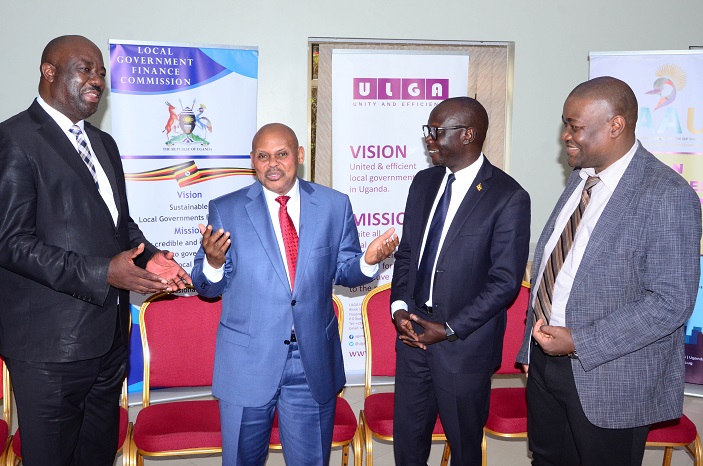
(L-R) Richard Rwabuhinga, President Uganda Local Government Association (ULGA), Isaac Isanga Musumba, Chairperson Local Government Finance Commission, Dr. Wilson Sanya Kirk Fixer, President Urban Authorities Association of Uganda (UAAU) and Zackey Kalega Ag. Commissioner Internal Trade Ministry of Trade interacting on the sidelines of negotiations between Local Government Finance Commission and line ministries held at Piato Restaurant in Kampala on Monday 26 August 2024. PHOTO BY COLLEB MUGUME
(L-R) Richard Rwabuhinga, President Uganda Local Government Association (ULGA), Isaac Isanga Musumba, Chairperson Local Government Finance Commission, Dr. Wilson Sanya Kirk Fixer, President Urban Authorities Association of Uganda (UAAU) and Zackey Kalega Ag. Commissioner Internal Trade Ministry of Trade interacting on the sidelines of negotiations between Local Government Finance Commission and line ministries held at Piato Restaurant in Kampala on Monday 26 August 2024.
HABARI DAILY I Kampala, Uganda I The Ministry of Public Service has launched an analysis of payroll registers of all Government workers in an effort to eradicate the persistent problem of salary and wage budget shortfalls and bridge the gaps in staffing by allowing Government to recruit workers.
The analysis follows the payroll audit, which commenced in April 2023, and identified the factors affecting the credibility and efficiency of the Government’s wage, pension, and gratuity management processes.
Conducted by the Auditor General, the headcount saw all Government workers appear in person for substantiation, whereby those who did not appear were removed from the payroll and no longer considered to be government employees.
Adam Tusiime Mugarra, the Assistant Commissioner human resource management at the Ministry of Public Service, said the process, which is being held in conjunction with the Ministry of Finance, is a wage analysis where officials with local government votes will personally table their financials and manpower requirements.
The meetings, which are set to last for two weeks, kicked off on Wednesday August 28th, at the National Archives Records Centre, along Sir Apollo Kaggwa Road.
“The main aim of this exercise is for us to interact with those respective votes and to confirm wage availability for recruitment before we authorize those local governments to resume recruitment of additional workers.
Mugarra added that votes which will be found with adequate wage for recruitment will be granted clearance to recruit.
“Those without sufficient wage for recruitment will not be granted clearance,” he said during negotiations between the Local Government Finance Commission and line ministries, being held at Piato Conference Hall in Kampala.
PAYROLL REGISTERS
He said for districts, they invited the chief administrative officers, the Head of Planning and the Head of Human Resources. For cities and municipalities, the worker’s ministry invited the Town Clerks, City Clerks, the Head of Human Resources and the Head of Planning.
“They were requested to come with the payroll registers from April to June. Over time, we noticed that some votes would go and recruit when they don’t have sufficient wage for paying the recruited staff. And this has led to various requests for supplementary allocation of wage. We want such to stop forthwith,” he said.
Said Mugarra: “So in order to avoid this, we are saying now before a vote is granted clearance to recruit, we must first ascertain wage availability. We want to bring to an end the practice of recruiting people who don’t have money to pay their salaries, which has also led to salary arrears and even legal battles, where people have run to courts of law for redress.”
He said once the process is completed, the Public Service ministry will be able to avoid issues of residual salary arrears, requests for supplementary allocation and request for wage.
Dr. Wilson Sanya the president of the Urban Authority Association of Uganda said in the last financial year 2023/24, local Governments performed poorly in national assessment due to understaffing.
“The ban to recruit staff was introduced as one of the cost-cutting methods in public service. But we have discovered that many local administrations don’t have sufficient staff to implement projects that would absorb all the money sent to them annually,” he said.
He said a big chunk of the money currently transferred to the local Governments is returned to the consolidated fund. “Whenever they come to assess us, they discover that many projects are not being implemented because there is no staff.”
Sanya, who is also the mayor of Koboko Municipality, said the majority of the staff who are implementing local Government projects are either acting or designated.
“Currently, the Koboko district procurement officer also handles Koboko Municipality. How can people fulfil their duties optimally when they are overworked?” he asked.
CONSOLIDATED FUND QUERIED
Richard Rwabuhinga, President Uganda Local Government Association (ULGA), wondered about the total amount of money that goes back to the Consolidated Fund at the end of every financial year.
“Who takes that money? We have never got a report on how that money taken back to the treasury is utilized or who spends it at the end of the day,” he asked.
He said the majority of local Governments are currently running at 65% staffing capacity, but they cannot recruit workers due to the ban on recruitment that was imposed by the central Government several months ago.
Catherine Bitarakwate, the Permanent Secretary of the Ministry of Public Service recently announced that public servants were to experience a delay in the payment of their July salaries until the 6th of August due to ongoing system upgrades.
“The system upgrade aims to ensure accuracy in payroll processing by automating validation controls. Public servants in ministries, departments, and agencies affected by ongoing mergers will continue to receive their salaries until new appointments are made.
Ramathan Ggoobi, the permanent secretary, ministry of finance and secretary to the Treasury (PSST), recently stated that they will use the results of the verification exercise to determine how much each government entity should receive each month for the purpose of paying salaries.
The recently issued Auditor General’s report titled: “Annual Report of the to Parliament for the Financial Year ended 30th June 2023,” disclosed that the total number of employees who were fully verified numbered 358,753, while 25,439 were partially verified, and 2,246 individuals were accounted for on the payroll, since they were away for genuine reasons, including official leave, sick leave, secondment and official work abroad, among other things.




